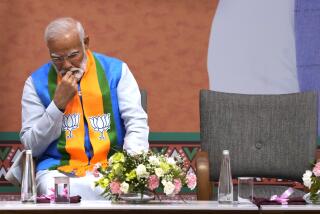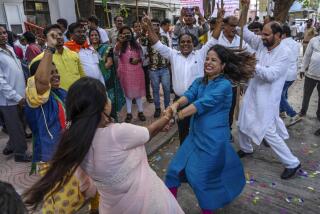Ruling Coalition in India Loses Key Support; Elections Possible
- Share via
NEW DELHI — The Congress Party, which has dominated Indian politics since leading the country to independence, suddenly withdrew its support from the governing coalition Sunday, meaning new elections may be necessary for the second time in a year.
Congress called on Prime Minister H. D. Deve Gowda to resign, blaming his center-left government for what it called a failure to curb Hindu nationalism and for a breakdown of law and order. Congress said it will seek to form the next government.
Gowda’s 14-party United Front coalition responded defiantly, saying it will battle to stay in office when Parliament reconvenes in three weeks. “There is no question of the resignation of Mr. Deve Gowda,” United Front spokesman Jaipal Reddy said.
Congress is expected to seek a no-confidence vote that the government would have difficulty winning without its support.
The Congress decision, which surprised even some of its own leaders, will set off a scramble by all sides for new alliances. A deadlock could lead to new elections. The coalition came to power after elections in May 1996.
“The Congress Party has staked a claim to form the government,” Congress Party leader Sitaram Kesari told reporters. Lacking Congress support, the government “must now resign and give an opportunity to Congress,” he said.
Working relations between Gowda and Kesari had been tense for a long time, and the two men were barely on speaking terms.
But the timing of the Congress move came as a surprise because India and Pakistan were engaged in their first formal dialogue for three years to try to ease tension between the hostile neighbors. The political upheaval was likely to overshadow the talks, due to end today.
Congress, the party that led India to independence from Britain in 1947, has headed Indian governments for all but five years since then. But it has fared badly in recent national and local elections.
Congress controls 138 seats in the 545-member lower house of Parliament. It never joined the coalition government but guaranteed its support to Gowda to block the Hindu nationalist Bharatiya Janata Party, the largest party in Parliament.
The BJP formed a federal government after the 1996 elections but failed to muster a majority and was forced to resign after 13 days.
More to Read
Sign up for Essential California
The most important California stories and recommendations in your inbox every morning.
You may occasionally receive promotional content from the Los Angeles Times.










